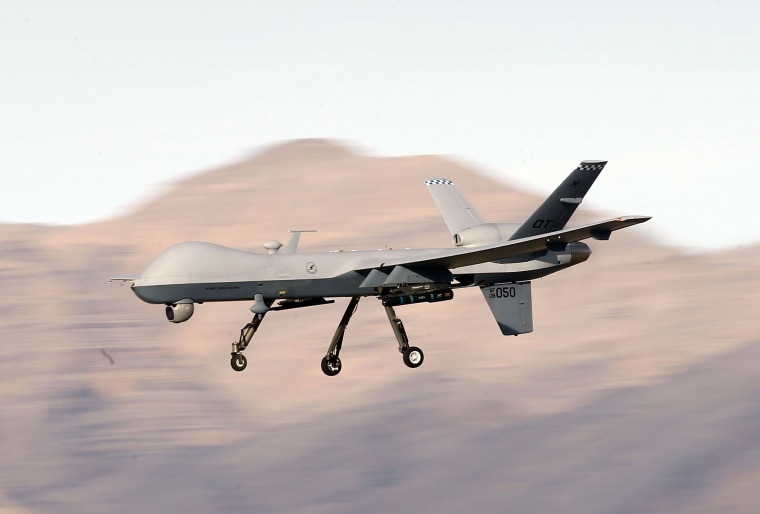WASHINGTON — The Defense Department is encouraging the sale of more than $500 million worth of armed drones to Qatar, even as the State Department has slow-rolled the Qatari government's request, say three U.S. officials and a congressional aide familiar with the discussions.
Qatar first asked the U.S. for armed MQ-9 Reaper drones last year, but the request has languished. Now Qatar is again pushing for the sale, leveraging the help it provided during the U.S. evacuation of Afghanistan and planning a full-court press when the country's emir, Sheikh Tamim bin Hamad Al Thani, visits Washington next month.
The Pentagon sees Qatar as a reliable partner that has proven itself responsible with advanced weapons like armed drones, said an official familiar with the discussions. The official added that Qatar could be helpful in the counterterrorism world and with "over-the-horizon strikes" in Afghanistan, meaning long-range airstrikes without U.S. boots on the ground.
Officials at the State Department, on the other hand, are concerned that the sale will anger some U.S. allies, including Saudi Arabia and the United Arab Emirates.
The Qatari emir plans to visit the U.S. next month, and drones are expected to be at the top of his agenda when he meets with President Joe Biden.
"As a matter of policy, the Department does not publicly comment on or confirm proposed defense sales or transfers until they have been formally notified to Congress," a State Department spokesperson said.
A defense official confirmed that the Pentagon would not object to the sale but said it is not aggressively advocating for it. The official acknowledged that the sale could have an effect on allies and partners and said the Pentagon does not want to destabilize the region. But the official said Qatar's having armed drones could bring more security to the region because of its counterterrorism efforts and support.
In addition to assisting the U.S. during the withdrawal from Afghanistan, Qatar also hosts the U.S. military at Al Udeid Air Base, home to U.S. Central Command's forward headquarters and the U.S. military's air operations center for the region. Qatar has contributed about $8 billion since 2003 toward developing the base, and it has hosted thousands of Afghan refugees there. It is also a part of the Global Coalition to Defeat ISIS.
Qatar is already the U.S.'s second-largest foreign military sales partner, with more than $26 billion in active cases. The U.S. sells Qatar Patriot long-range missile defense systems, the F-15QA fighter aircraft — the most advanced F-15 in the U.S. inventory — and AH-64E Apache attack helicopters.
A possible sale of U.S.-made drones to Qatar could spark opposition from America's allies in the Middle East.
Qatar has had tense relations with other Arab Gulf states because of its support for Muslim Brotherhood organizations in the region, its backing of the Al Jazeera television network and its relatively friendly relations with Iran.
In June 2017, Saudi Arabia, the United Arab Emirates, Bahrain and Egypt cut off relations with Qatar and imposed a costly embargo, alleging that it supported terrorists. Qatari-flagged ships were banned from docking at many regional ports, and Qatari aircraft were banned from airspace in much of the region.
Relations were restored in January and the embargo was lifted, but there is lingering friction between Qatar and the other Gulf governments, especially the UAE.
Israel also has concerns about Qatar's ties to Hamas. Any U.S. arms sale would have to comply with a U.S. law that requires that Israel maintain a qualitative military edge in the region.
The U.S. government has moved to allow a small number of countries to buy armed drones, including the United Kingdom, Australia, France, Germany and Taiwan, but not all of those countries have exercised their options to buy them. The UAE was also authorized to buy armed drones last year under the Abraham Accords, which began normalization of relations between the UAE and Israel.
Two NATO allies, Belgium and the Netherlands, also have initial approval from the U.S. government to buy drones.


